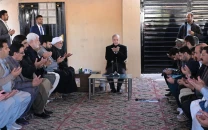NYT cartoon on Mullah Mansour's death hits a little too close to home
This New York Times cartoon shows the state of affairs following death of Mullah Mansour

Just as Pakistan was making every effort to broker talks between the Taliban and Afghan officials, an American drone strike killed the militant group's leader Mullah Akhtar Mansour on Pakistani soil.
Perhaps this New York Times cartoon perfectly sums up the state of affairs following the death of the Afghan Taliban leader. One can see a befuddled Nawaz Sharif, an accusing Afghan Taliban militant and a nonchalant Obama, controlling the drone. As a bearded Taliban leader armed with a Kalashnikov points a finger at Nawaz screaming “I thought we were friends!,” an obviously betrayed Nawaz disappointingly looks towards Obama with the same question.
Pakistan denounces US strike believed to have killed Afghan Taliban chief: FO
.@PatChappatte on the drone strike that killed Mullah Mansour https://t.co/21RFlGvrG4 pic.twitter.com/xiiuWRfeN3
— New York Times Opinion (@nytopinion) May 24, 2016 ">.@PatChappatte on the drone strike that killed Mullah Mansour https://t.co/21RFlGvrG4 pic.twitter.com/xiiuWRfeN3
— New York Times Opinion (@nytopinion) May 24, 2016
The US killing of Taliban chief marks a significant shift for President Barack Obama, highlighting a new willingness to target the group’s leaders in Pakistan and risk retaliatory attacks against struggling Afghan security forces.
The move also shows that Obama has — at least for now — abandoned hopes of bringing the Taliban to the negotiating table for peace talks.
The Pak-US relationship has again taken a hit after the drone strike with the US accusing Pakistan of harbouring Afghan Taliban. “We killed the leader of the Taliban driving across Balochistan in a taxi,” a former senior State Department official told The New York Times. “I think we have some questions to ask of Pakistan.”
Strike on Taliban chief shows dimming US hopes for Afghan peace
According to AFP, Mansour had once appeared in favour of peace negotiations with the government in Kabul, but he had refused to join talks when he became Taliban chief.
However, Pakistan has not only expressed concern over the drone strike inside its territory, it has also questioned the claim that Mansour was opposed to talks.
Chaudhry Nisar Ali Khan, the federal interior minister, on Monday, said the insurgents had almost agreed on declaring Kabul a ‘conflict-free zone’ in their first face-to-face meeting with Afghan officials in Murree last year.
The Pakistan-brokered Murree peace initiative broke down in July after the two-year-old death of longtime Taliban leader Mullah Omar was leaked to the media.
Afghan Taliban elect Mullah Mansour's successor, confirm death in US drone strike
“The second direct contact [between the Taliban and Afghan officials] was scheduled for July 31, but it was sabotaged at the eleventh hour by leaking the news of Mullah Omar’s death to the media,” Chaudhry Nisar Ali Khan, told a news conference in Islamabad. He also hinted that the Taliban’s participation in the Murree process had full blessings of Mansour.



















COMMENTS
Comments are moderated and generally will be posted if they are on-topic and not abusive.
For more information, please see our Comments FAQ